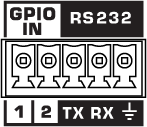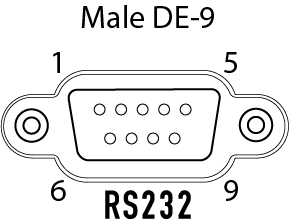Serial Port (Core and I/O Devices)
Q-SYS Core processors and peripherals include an RS-232 connection for extension of Q-SYS Control to third-party devices, such as projectors, TVs, and A/V receivers. You can control and read from these devices using Lua script from a Q-SYS scripting component.
Tip: To learn about scripting in Q-SYS, see Control Scripting.
The Serial Port component represents the RS-232 serial connection pins on the rear of the Q-SYS Core. The connector varies depending on the hardware.
The RS-232 Serial Port Components allow you to make a connection to the RS-232 connectors on the processor for Lua Scripting. When a connection is made, and an appropriate Serial Port (RS-232) Control Script written, you can control and read from devices such as DVD players, recording hardware, video, lighting, and so on.
To learn about scripting in Q-SYS, see Control Scripting.

| Pin | Description |
|---|---|
|
TX |
Transmit pin. Connect this pin to the RX (receive) pin on the other device. |
|
RX |
Receive pin. Connect this pin to the TX (transmit) pin on the other device. |
|
Ground |
Earth ground reference. |
Note: On the NV-32-H (Core Capable), the RS-232 and GPIO IN pins share a 5-pin Euro connector. You can use both connection types simultaneously.

| Pin | Description |
|---|---|
|
TX |
Transmit pin. Connect this pin to the RX (receive) pin on the other device. |
|
RX |
Receive pin. Connect this pin to the TX (transmit) pin on the other device. |
|
Ground |
Earth ground reference for GPIO input and RS-232 connections. |

| Pin | Description |
|---|---|
|
2 |
RX (Receive) |
|
3 |
TX (Transmit) |
|
4 |
(I/O-22 only) Provides +5.5VDC @ 70mA |
|
5 |
GND (Signal Ground) |
Note: All other pins on a Core are not supported.
This signal to DE-9 configuration is known as DTE. All 9-pin D-Shell RS-232 pinned as DTE have this configuration. All PC serial ports are DTE as is the Core. Usually peripherals are DCE, which reverses the receive and transmit pins, allowing a straight-thru cable to be used.
You must check the pinout of any equipment, including the cable, to be connected to a Q-SYS serial port for input or output. Many times in serial troubleshooting, problems may be solved by inserting a "null-modem" adapter or cable to swap the TX and RX pin positions. For custom terminated DE-9 connectors, pins 2 and 3 may need to be swapped on one end of the cable. In any case, a TX pin on one end MUST be connected to an RX pin on the other and vise-versa for data to flow properly.
Input Pins
This component has no output pins.
Output Pins
Serial Port 
Connect this pin to the Serial Input pin of a Q-SYS scripting component, such as Block Controller, Text Controller, or Control Script. You must configure these components for serial communication.
The Serial Port component has no specific configurable properties.
Tip: For additional properties that are not listed, refer to the Properties Panel help topic for more information.
TX Bytes
Displays a running total of the number of bytes sent.
RX Bytes
Displays a running total of the number of bytes received.
Reset
Resets both TX Bytes and RX Bytes to zero.
|
Pin Name |
Value |
String |
Position |
Pins Available |
|---|---|---|---|---|
|
Receive Bytes |
Text Box |
Output |
||
|
Reset |
Trigger |
Input / Output |
||
|
Transmit Bytes |
Text Box |
Output |
||
